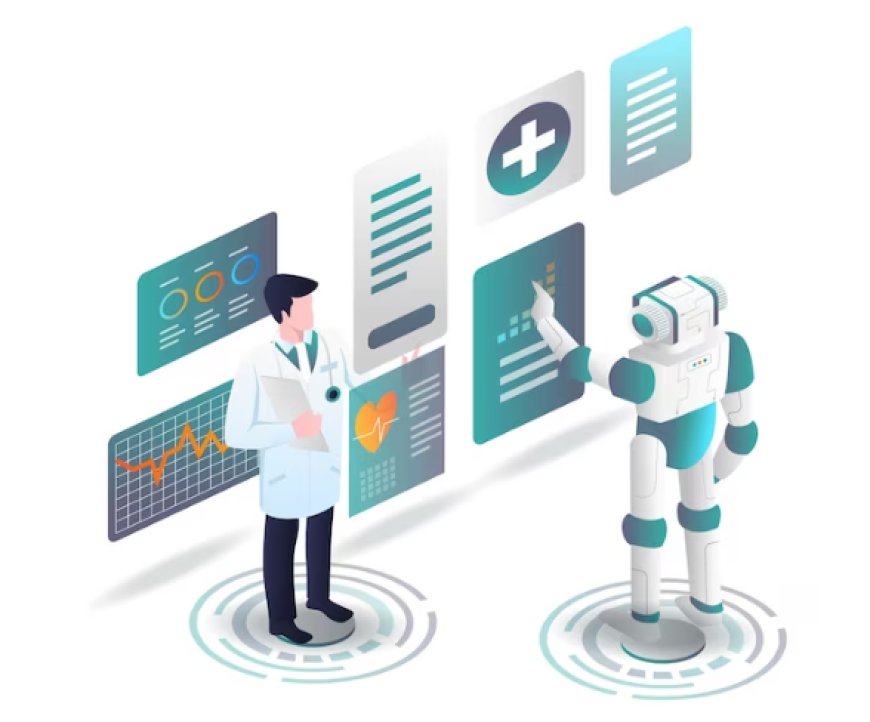The Role of AI in Healthcare
Explore the transformative role of AI in healthcare. Discover how artificial intelligence is reshaping medical diagnosis, treatment, and patient care.

In today's ever-changing healthcare environment, the integration of Artificial Intelligence (AI) has become a powerful catalyst, bringing about a significant transformation in patient care, diagnostic procedures, and treatment approaches. By harnessing its ability to analyze vast amounts of data and provide actionable insights, AI has greatly enhanced the accuracy, speed, and effectiveness of medical interventions. This technology enables early detection of illnesses and the customization of treatment plans, reshaping the healthcare sector and offering unprecedented opportunities for groundbreaking advancements and improved patient well-being. With AI empowering healthcare professionals to make data-informed decisions and offering patients more precise and personalized medical solutions, it is at the forefront of revolutionizing the delivery of healthcare services. Ultimately, this contributes to better health outcomes and a higher quality of life for individuals worldwide.
Precision Diagnostics and Early Disease Detection
AI-driven diagnostic tools have revolutionized the accuracy and efficiency of disease detection. Machine learning algorithms can analyze complex medical data, including imaging scans, genetic profiles, and clinical records, to identify subtle patterns indicative of potential health risks. This enables early intervention and personalized treatment plans, leading to improved prognoses and better patient outcomes. For instance, AI-powered imaging analysis can facilitate the early detection of cancerous tumors, enabling timely treatment interventions and potentially saving lives.
Personalized Treatment and Care Management
The integration of AI in healthcare has facilitated the development of personalized treatment plans tailored to individual patient needs. By analyzing patient data, including medical history, genetic information, and lifestyle factors, AI algorithms can recommend personalized treatment regimens that consider the unique characteristics and requirements of each patient. This personalized approach not only improves treatment efficacy but also enhances patient satisfaction and engagement in their own healthcare journey, leading to better overall health outcomes and improved quality of life.
The advancements brought about by AI in healthcare are undeniable, transforming patient care and diagnostic capabilities. However, there are critical challenges that demand careful consideration and proactive measures from healthcare stakeholders. Data privacy and security are top concerns, requiring robust protection protocols to safeguard sensitive patient information. Ethical implications also arise, emphasizing the need for comprehensive guidelines and frameworks that prioritize transparency, fairness, and accountability in AI-driven decision-making. Effective regulatory oversight is crucial to ensure responsible development, deployment, and use of AI in healthcare, complying with industry standards and ethical best practices.
Data Privacy and Security Concerns:
Robust Data Protection Protocols: Implementing stringent data protection measures, such as encryption, access controls, and secure data storage, is imperative to safeguard sensitive medical data from unauthorized access and breaches.
Data Governance and Privacy Regulations: Strengthening data governance practices and advocating for stringent privacy regulations can help ensure the confidentiality and privacy of patient information, fostering trust in AI-enabled healthcare services.
Compliance with Industry Standards: Adhering to industry best practices and standards for data privacy and security can enhance the overall security posture of AI-driven healthcare systems, providing a solid foundation for protecting patient data against potential threats and vulnerabilities.
Ethical Considerations and Bias Mitigation:
1. Comprehensive Ethical Guidelines: The development of comprehensive ethical guidelines involves input from not only AI experts but also healthcare professionals, ethicists, patient advocates, and legal experts. These guidelines should address issues such as transparency in AI decision-making, accountability for system errors, and the right to human oversight. Regular reviews and updates are necessary to adapt to evolving ethical standards and changing healthcare landscapes.
2. Inclusive AI Development Teams: Promoting diversity and inclusivity within AI development teams is vital, not only in terms of demographic diversity but also diversity of thought and experience. By fostering a multidisciplinary approach, AI developers can better understand the nuances of healthcare ethics and potential sources of bias. Collaborative efforts among professionals from various backgrounds can lead to the creation of more culturally and ethically sensitive AI solutions.
3. Regular Bias Audits and Assessments: Periodic bias audits and assessments should be conducted by independent parties to maintain the integrity of AI systems. These assessments should not only focus on technical biases within the algorithms but also consider any inadvertent biases in the data sources used for training. Corrective actions and adjustments to the algorithms should be taken promptly to ensure that AI systems are fair and do not perpetuate discrimination.
4. Equitable Access to Healthcare Services: Achieving equitable access to healthcare services through AI-driven solutions necessitates proactive measures. This includes monitoring healthcare outcomes to identify and address disparities in diagnosis, treatment, and patient care. Policies should be put in place to bridge gaps in access to healthcare resources, ensuring that AI technologies are used to democratize healthcare rather than exacerbate existing disparities.
5. Informed and Consent-Based Data Usage: AI in healthcare relies on patient data, and respecting patient autonomy is paramount. Patients should be informed about how their data is used and have the choice to opt in or out of AI-driven healthcare interventions. Transparent communication regarding data usage is central to building patient trust in AI technologies.
How can we create an ethical healthcare environment that maximizes AI's potential while ensuring patient privacy, security, and trust amidst its transformative impact and challenges?
Creating a responsible and ethical environment in healthcare that maximizes the potential of AI while ensuring patient privacy, security, and trust requires a comprehensive approach that balances technological advancement with ethical considerations.
Here are some key strategies to achieve this:

Comprehensive Regulatory Framework: Establishing a robust regulatory framework entails not only setting clear guidelines for data protection and usage but also enforcing compliance through regular assessments and audits. Collaboration between regulatory bodies, healthcare institutions, and technology experts is vital to continuously update and adapt the framework to address emerging challenges and technological advancements in AI healthcare applications.
Privacy-Preserving AI Technologies: In addition to implementing privacy-preserving techniques, fostering a culture of data security awareness among healthcare professionals is crucial. This involves training healthcare staff on best practices for handling and protecting sensitive patient data, emphasizing the importance of maintaining confidentiality and ensuring that data privacy protocols are consistently followed across all AI-enabled healthcare systems.
Ethical AI Development Guidelines: Integrating ethical AI development guidelines requires a multidisciplinary approach that involves not only technical experts but also ethicists, legal professionals, and patient representatives. Creating a platform for open discussions and debates on ethical dilemmas and their implications for AI-driven healthcare can promote a culture of responsible innovation and encourage the continuous refinement of ethical guidelines to keep pace with evolving societal values and norms.
Informed Consent and Transparent Communication: Establishing mechanisms for obtaining informed consent from patients involves designing clear and accessible information materials that outline the purpose, benefits, and risks of AI technologies in healthcare. In addition, fostering open lines of communication between healthcare providers and patients encourages a patient-centric approach, where patients feel empowered to participate actively in their healthcare decision-making process.
Interdisciplinary Collaboration and Education: Facilitating interdisciplinary collaboration requires creating platforms for knowledge-sharing and skill development across different healthcare sectors and disciplines. Training programs that promote a deep understanding of AI technology, data privacy, and ethical considerations can foster a collaborative environment where healthcare professionals are equipped with the necessary expertise to navigate complex ethical challenges associated with AI implementation in healthcare. Moreover, organizing regular workshops, seminars, and conferences focused on the ethical implications of AI in healthcare can encourage ongoing discussions and the exchange of best practices within the industry.
The integration of AI in healthcare is a game-changer that brings precision medicine, better patient outcomes, and improved healthcare services. However, it's crucial to approach this transformation with a proactive and responsible mindset that values patient privacy, data security, and ethical considerations. To fully harness the potential of AI in healthcare, we need to foster a culture of transparency, accountability, and inclusivity in its development and implementation. This way, we can uphold patient trust and ethical integrity. Collaboration between healthcare providers, regulatory bodies, and technology experts is key to shaping a future where AI-driven healthcare services are not only cutting-edge but also built on principles of privacy, security, and equal access to quality care. As we navigate the ever-changing landscape of AI in healthcare, responsible innovation and ethical deployment must always be at the forefront to ensure a sustainable and patient-centric healthcare ecosystem.





































